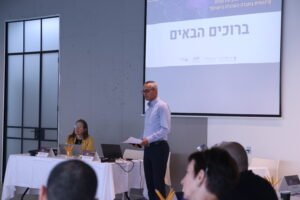بارك بارليف هاي تيك، 12 أكتوبر 2021
مقدمة
في ظل التحولات الرقمية المتسارعة، أصبح تعزيز التكنولوجيا المالية (FinTech) والابتكار المالي أولوية أساسية لتعزيز الشمول المالي في المجتمع العربي داخل إسرائيل. وفي هذا الإطار، بادر كل من مجتمع التكنولوجيا المالية الإسرائيلي، المنتدى الاقتصادي العربي، صناديق كورات للتنمية الاقتصادية، المنتدى الإسرائيلي للنهوض بالاقتصاد، شركة إمباكت، ووكالة الشركات الصغيرة والمتوسطة في وزارة الاقتصاد إلى إطلاق مبادرة تهدف إلى تقليص الفجوات الاقتصادية والاستجابة للتحديات التي تعيق اندماج المجتمع العربي في النشاط الاقتصادي الإسرائيلي، خاصة في ظل التحول الرقمي الذي يشهده الجهاز المصرفي خلال العقد الأخير.
الشمول المالي من خلال التكنولوجيا يمثل فرصة كبيرة لتحسين الوصول إلى الخدمات المالية، خاصة بين الفئات السكانية التي تعاني من ضعف الاندماج في النظام المصرفي التقليدي. تكنولوجيا الخدمات المالية توفر أدوات تساعد على:
- تمكين الأفراد الذين ليس لديهم حسابات مصرفية من الوصول إلى خدمات مالية متقدمة.
- تسهيل وصول الفئات المحرومة إلى خيارات الدفع، التمويل، والتأمين.
مفهوم الشمول المالي وفق البنك الدولي
يعرف البنك الدولي الشمول المالي على أنه قدرة الأفراد والشركات على الوصول إلى منتجات وخدمات مالية ميسورة التكلفة تلبي احتياجاتهم، بما في ذلك:
- المعاملات والمدفوعات الإلكترونية
- المدخرات والاستثمارات
- الائتمان والقروض
- التأمين والخدمات المالية الأخرى
يتم تحقيق هذا الشمول عبر آليات مسؤولة ومستدامة، تعتمد على أربعة مكونات رئيسية:
- إمكانية الوصول: القدرة على فتح حساب مصرفي بسهولة.
- القدرة على تحمل التكاليف: جعل الخدمات المالية متاحة بتكاليف معقولة.
- سهولة الاستخدام: توفير حلول مالية مرنة وسهلة التفاعل.
- التوزيع الفعّال: ضمان وصول الخدمات عبر منصات ومؤسسات موثوقة.
بالإضافة إلى ذلك، تختلف الاحتياجات المالية بين الفئات السكانية المختلفة، مما يتطلب حلولًا مصممة خصيصًا لكل مجموعة.
دور التكنولوجيا المالية في تعزيز الشمول المالي
تشير الدراسات الحديثة إلى أن التكنولوجيا المالية تمثل عاملًا رئيسيًا في تعزيز الشمول المالي، خاصة بين الفئات التي تعاني من ضعف الوصول إلى الخدمات المصرفية التقليدية. وتعمل استراتيجيات التكنولوجيا المالية على:
- تحسين فرص الحصول على التمويل.
- تعزيز التنقل المالي للأفراد والشركات.
- تبسيط العمليات المصرفية من خلال الهوية الرقمية وأنظمة الدفع الإلكتروني.
وفقًا لمنظمة الأعمال الأوروبية، فإن التكنولوجيا المالية تساهم في تحقيق أهداف التنمية المستدامة للأمم المتحدة (SDGs) من خلال:
- الحد من الفقر وعدم المساواة.
- تعزيز الشفافية المالية والتنمية الاقتصادية.
- تمكين المرأة وتعزيز الشمول الاقتصادي.
- تحسين الصحة العامة والاستدامة البيئية.
وفقًا لمراجعة قانون منظمة الأعمال الأوروبية، فإن التكنولوجيا المالية توفر حلولًا مستدامة تساعد في تسهيل الوصول إلى الخدمات المصرفية وتحسين الاستدامة المالية، مما يعزز من قدرة المجتمعات المهمشة على التكامل في الاقتصاد العالمي (الاستدامة والتكنولوجيا المالية والشمول المالي، مراجعة قانون منظمة الأعمال الأوروبية، 2020، 21: 7–35).
ورشة عمل لتعزيز التكنولوجيا المالية في المجتمع العربي
في أكتوبر 2021، تم عقد ورشة عمل متخصصة لمناقشة فرص وتحديات التكنولوجيا المالية في المجتمع العربي، بمشاركة ممثلين عن:
- مؤسسات التكنولوجيا المالية
- الجمعيات والمنظمات غير الربحية
- البنوك والمؤسسات المصرفية
- الجهات التنظيمية والاقتصادية
أبرز القضايا المطروحة في ورشة العمل:
- تحليل معدلات الثقافة المالية والتكنولوجية في ظل التحول الرقمي والتغيرات الاجتماعية والثقافية في المجتمع العربي.
- دراسة مدى توفر البيانات حول استخدام الإنترنت والتطبيقات المصرفية وحلول التكنولوجيا المالية في المجتمع العربي.
- مراجعة معدلات تبني واستخدام وسائل الدفع المختلفة (النقد، بطاقات الائتمان، المحافظ الرقمية، التطبيقات المصرفية).
- تأثير اللغة العبرية كحاجز أمام الاندماج في النظام المالي الرقمي.
- دور الدين وأحكام الشريعة في تحديد مدى قبول الخدمات المالية الرقمية في المجتمع العربي.
- تحديد البدائل المتاحة للفئات ذات الوصول المحدود إلى الخدمات المصرفية التقليدية (مثل بنوك البريد، القروض من الجمعيات).
- تحليل مدى انتشار المحافظ الرقمية بين العمال الأجانب والمجتمع العربي.
- دراسة الفصل بين السلوك المالي الشخصي والسلوك المالي التجاري لدى الأسر التي تدير مشاريع صغيرة.
التحديات الرئيسية أمام الشمول المالي في المجتمع العربي
بناءً على المناقشات وخبرة المشاركين في ورشة العمل، تم تحديد مجموعة من العوائق التي تحول دون الوصول الفعّال للخدمات المالية، أبرزها:
- انعدام الثقة في النظام المالي:
- ارتفاع نسبة الأفراد الذين لا يمتلكون حسابات مصرفية.
- ضعف الثقة في المؤسسات المالية بسبب تجارب سابقة سلبية.
- الاعتماد الكبير على النقد مقابل أدوات الدفع الرقمية:
- تفضيل الدفع النقدي على حساب بطاقات الائتمان والمحافظ الإلكترونية.
- الاعتماد على العامل البشري في المعاملات المالية بدلاً من الأدوات الرقمية.
- اللغة العبرية كعائق ثقافي:
- رغم أن بعض المشاركين لا يعتبرونها حاجزًا رئيسيًا، إلا أن استخدامها في المعاملات المصرفية يحد من سهولة الوصول إلى الخدمات المالية.
- محدودية الوصول إلى الائتمان المصرفي:
- يلجأ العديد من الأفراد إلى الائتمان غير المصرفي لعدم توفر بدائل أخرى.
- عدم وضوح الفصل بين الإدارة المالية الشخصية والتجارية:
- مما يؤدي إلى تحديات في تنظيم وإدارة الأعمال الصغيرة.
- ارتفاع تكاليف الخدمات المصرفية:
- يؤثر ذلك على القدرة على تحمل تكاليف الخدمات المالية واستخدامها.
- عدم احتساب سجل الائتمان غير المصرفي في تقييم الجدارة الائتمانية:
- يؤدي إلى حرمان العديد من الأفراد من فرص التمويل الرسمية.






